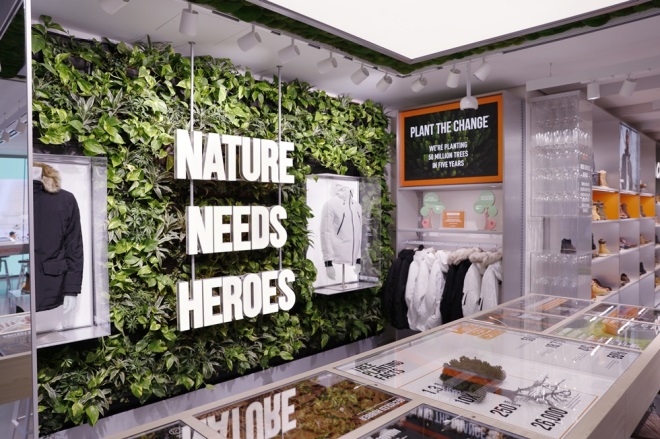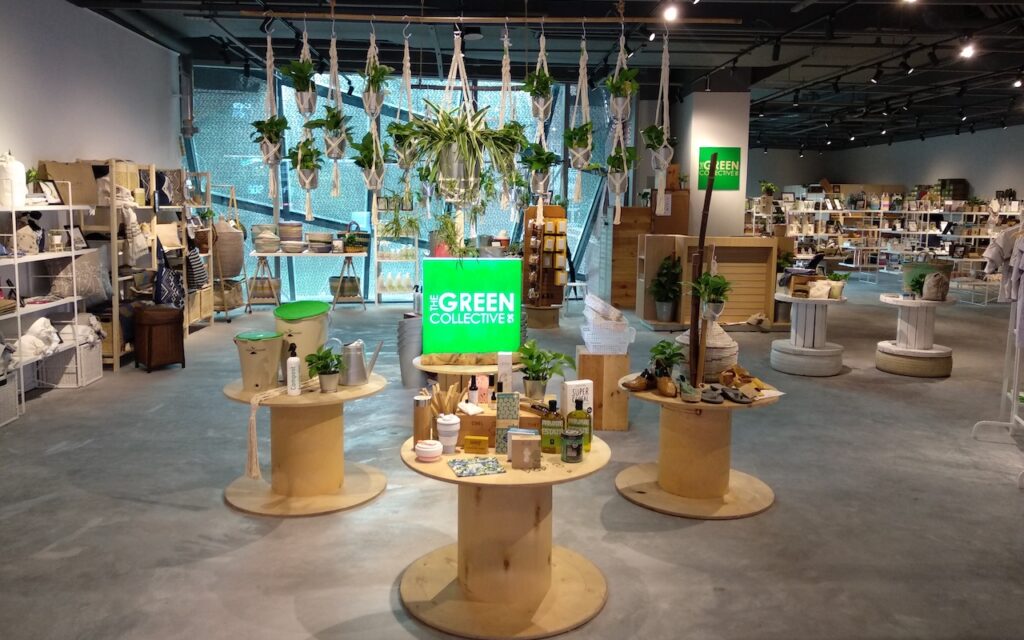Eco-Conscious Consumption: A Deep Dive into Eco-Friendly Store Offerings
In recent years, a growing awareness of environmental issues has led consumers to seek more sustainable and eco-friendly alternatives in various aspects of their lives. This shift in consumer behavior has prompted retailers to reevaluate their offerings, paving the way for a new era of eco-conscious consumption. From innovative packaging to responsibly sourced materials, eco-friendly store offerings are making waves in the retail landscape.
The Rise of Sustainable Packaging

One of the key aspects of eco-conscious consumption is the move towards sustainable packaging solutions. Traditional packaging, often made from non-biodegradable materials, contributes significantly to environmental pollution. Eco-friendly stores are now opting for biodegradable and compostable packaging, minimizing their ecological footprint. These alternatives not only reduce waste but also serve as a testament to the commitment of these stores to environmental preservation.
Furthermore, some eco-conscious retailers are adopting a circular economy approach, where packaging is designed to be reused or recycled. This shift not only addresses the issue of waste but also encourages customers to actively participate in the recycling process. By incorporating sustainable packaging, eco-friendly stores are not only meeting consumer expectations but also setting a new standard for the industry. Services such as emergency restoration services in Charlotte offer the option of taking away the remains of replaced pipes or plastic after the job is done, which guarantees that the old stuff will be recycled.
Ethical Sourcing and Fair Trade Practices
The selling business advisor mentions an aspect that many stores do not see as ecological at first. A crucial aspect of eco-friendly store offerings is the emphasis on ethical sourcing and fair trade practices. Consumers are increasingly concerned about the origin of the products they purchase, including the environmental and social impact of the production process. Eco-conscious stores are responding to these concerns by carefully selecting suppliers who adhere to strict ethical and fair trade standards.
By prioritizing fair wages, safe working conditions, and environmentally friendly practices, these stores are fostering a more sustainable supply chain. This commitment to ethical sourcing not only resonates with environmentally conscious consumers but also contributes to the overall improvement of working conditions in various industries. As eco-friendly store offerings continue to evolve, ethical considerations will likely play a central role in shaping consumer preferences.
Innovations in Renewable Energy Integration
Eco-friendly stores are increasingly turning to renewable energy sources to power their operations. From solar panels to wind turbines, these retailers are investing in innovative technologies to reduce their reliance on non-renewable energy. This shift not only aligns with the broader goal of reducing carbon footprints but also sets an example for other industries to follow suit. With the help of the Colorado Springs SEO company, awareness of these stores is spreading and more and more companies are turning to ecological business.
By harnessing the power of renewable energy, eco-conscious stores contribute to the global effort to combat climate change. This commitment to sustainability extends beyond product offerings, demonstrating a holistic approach to environmental responsibility. As technology continues to advance, we can expect to see even more innovative solutions that integrate renewable energy into the core operations of eco-friendly stores.
The Role of Consumer Education in Eco-Conscious Consumption
While eco-friendly store offerings are expanding, the success of this movement also relies on consumer education. Many consumers are still unaware of the environmental impact of their choices and the available alternatives. Eco-conscious stores are taking on an active role in educating their customers about the importance of sustainable practices and the benefits of eco-friendly products.
Through in-store signage, online resources, and community outreach programs, these stores aim to empower consumers to make informed decisions. The easiest way to spread awareness about this is with the help of Google ads, and if you notice that your Google ads are suspended or you have similar problems, call a professional to solve them for you. By bridging the gap between awareness and action, eco-friendly retailers are fostering a sense of responsibility among their customers. Ultimately, the success of eco-conscious consumption hinges on the collective efforts of both retailers and consumers to create a more sustainable future.
In recent years, a growing awareness of environmental issues has led consumers to seek more sustainable and eco-friendly alternatives in various aspects of their lives. This shift in consumer behavior has prompted retailers to reevaluate their offerings, paving the way for a new era of eco-conscious consumption. From innovative packaging to responsibly sourced materials, eco-friendly store offerings are making waves in the retail landscape. Small businesses, such as the production of handmade saddle blankets, are even more committed to packaging their product in the most interesting and environmentally friendly packaging possible.
The Rise of Sustainable Packaging
One of the key aspects of eco-conscious consumption is the move towards sustainable packaging solutions. Traditional packaging, often made from non-biodegradable materials, contributes significantly to environmental pollution. Eco-friendly stores are now opting for biodegradable and compostable packaging, minimizing their ecological footprint. These alternatives not only reduce waste but also serve as a testament to the commitment of these stores to environmental preservation.
Furthermore, some eco-conscious retailers are adopting a circular economy approach, where packaging is designed to be reused or recycled. This shift not only addresses the issue of waste but also encourages customers to actively participate in the recycling process. By incorporating sustainable packaging, eco-friendly stores are not only meeting consumer expectations but also setting a new standard for the industry. With the help of the Readathon school fundraiser, children collect money with the help of reading, as well as all returnable packaging from such manufacturers, and some school events are financed from this.
Ethical Sourcing and Fair Trade Practices

Another crucial aspect of eco-friendly store offerings is the emphasis on ethical sourcing and fair trade practices. Consumers are increasingly concerned about the origin of the products they purchase, including the environmental and social impact of the production process. Eco-conscious stores are responding to these concerns by carefully selecting suppliers who adhere to strict ethical and fair trade standards.
By prioritizing fair wages, safe working conditions, and environmentally friendly practices, these stores are fostering a more sustainable supply chain. This commitment to ethical sourcing not only resonates with environmentally conscious consumers but also contributes to the overall improvement of working conditions in various industries. As eco-friendly store offerings continue to evolve, ethical considerations will likely play a central role in shaping consumer preferences.
Innovations in Renewable Energy Integration
Eco-friendly stores are increasingly turning to renewable energy sources to power their operations. From solar panels to wind turbines, these retailers are investing in innovative technologies to reduce their reliance on non-renewable energy. This shift not only aligns with the broader goal of reducing carbon footprints but also sets an example for other industries to follow suit.
By harnessing the power of renewable energy, eco-conscious stores contribute to the global effort to combat climate change. This commitment to sustainability extends beyond product offerings, demonstrating a holistic approach to environmental responsibility. As technology continues to advance, we can expect to see even more innovative solutions that integrate renewable energy into the core operations of eco-friendly stores.
The Role of Consumer Education in Eco-Conscious Consumption
While eco-friendly store offerings are expanding, the success of this movement also relies on consumer education. Many consumers are still unaware of the environmental impact of their choices and the available alternatives. Eco-conscious stores are taking on an active role in educating their customers about the importance of sustainable practices and the benefits of eco-friendly products.
Through in-store signage, online resources, and community outreach programs, these stores aim to empower consumers to make informed decisions. By bridging the gap between awareness and action, eco-friendly retailers are fostering a sense of responsibility among their customers. Ultimately, the success of eco-conscious consumption hinges on the collective efforts of both retailers and consumers to create a more sustainable future.
The Role of Technology in Enhancing Eco-Friendly Store Offerings
In the realm of eco-conscious consumption, technology is emerging as a powerful ally for eco-friendly stores. The integration of cutting-edge technologies is opening new avenues for sustainable practices and enhancing the overall eco-friendly shopping experience. From artificial intelligence-driven inventory management to virtual reality-powered eco-education, the tech-savvy approach of these stores is redefining the way consumers engage with sustainable products. This kind of technology concept is being incorporated into smart houses like homes in Boca Falls and helping individuals in their daily lives.
Artificial intelligence (AI) plays a pivotal role in optimizing inventory and supply chain management for eco-friendly stores. By analyzing historical data and predicting consumer trends, AI enables these retailers to streamline their operations, reducing waste and minimizing environmental impact. All of this requires advanced technology and a better internet service provider like managed IT services in San Antonio. Additionally, AI-driven systems can help in dynamic pricing strategies, encouraging customers to choose eco-friendly options by making them more financially appealing.
Moreover, virtual reality (VR) is being utilized to create immersive and educational experiences within eco-friendly stores. Customers can virtually explore the supply chain of products, from sourcing raw materials to the manufacturing process and final delivery. This transparency fosters a deeper connection between consumers and the products they choose, promoting a sense of accountability and understanding of the environmental implications of their purchases. This type of technology is also used by science tutors in Boulder to convey knowledge to students in creative and unique ways.
Community Engagement and Grassroots Initiatives
Eco-friendly stores are increasingly recognizing the importance of community engagement and grassroots initiatives in fostering sustainable practices. Beyond merely providing eco-friendly products, these stores are actively involved in local initiatives that promote environmental awareness and conservation. For example, you can rent a camper and drive around Key West and enjoy the natural beauty of the island, which they try to maintain ecologically. This involvement extends to supporting community gardens, organizing clean-up events, and collaborating with local schools for eco-education programs.
By becoming integral parts of their communities, eco-friendly stores not only contribute to local environmental causes but also build a sense of shared responsibility among residents. This community-centric approach goes beyond the transactional nature of retail, creating a symbiotic relationship between eco-friendly stores and the neighborhoods they serve. As these initiatives grow, they have the potential to spark broader regional and national movements toward sustainability. Rent a car in Beograd strives to contribute at its local level to the wider ecological chain that affects all of us.
The Role of Art and Aesthetics in Eco-Friendly Retail Spaces
Eco-friendly stores are reimagining the aesthetics of retail spaces, incorporating art and design to create visually appealing and environmentally conscious environments. From recycled materials used in interior design to installations that highlight environmental themes, these stores are transforming the shopping experience into a form of sustainable art. By merging aesthetics with eco-conscious values, retailers aim to inspire customers and evoke a sense of appreciation for the beauty of sustainability.
Incorporating living green walls, repurposed furniture, and energy-efficient lighting, eco-friendly stores are turning their spaces into showcases of eco-friendly design. The goal is to make sustainability not only a part of the product offering but an integral aspect of the overall shopping ambiance. As customers step into these visually engaging spaces, they are immersed in an environment that reflects the store’s commitment to both style and sustainability. In the hospitality courses, among other things, you can learn ways to satisfy customers and direct clients to the desired goal.
Eco-Friendly Store Collaborations and Partnerships
Collaborations and partnerships between eco-friendly stores and other businesses are becoming increasingly common, amplifying the impact of sustainable practices. By joining forces with like-minded organizations, eco-friendly retailers can expand their reach and influence across various industries. Collaborative efforts can range from joint marketing campaigns to shared research and development initiatives aimed at creating more sustainable products. This also includes services, such as the transmission service in Buffalo, which affects the awareness of drivers to check the level of pollution of their cars to improve the environmental impact on nature.
For instance, an eco-friendly grocery store might collaborate with local farmers to ensure a direct and sustainable supply chain for fresh produce. Similarly, partnerships with technology companies can lead to the development of innovative solutions, such as apps that help customers track the environmental footprint of their purchases. These collaborations not only enhance the offerings of eco-friendly stores but also create a network of businesses working collectively towards a greener future.
Eco-Friendly Store Certification and Standards
To further solidify their commitment to sustainability, eco-friendly stores are increasingly seeking certification from recognized environmental standards and organizations. Certification provides a transparent and credible way for these stores to communicate their adherence to specific eco-friendly practices. Whether it’s obtaining certifications for carbon neutrality, sustainable sourcing, or waste reduction, these credentials serve as a badge of honor and a way for consumers to make informed choices. In everyday life, car tires also create a kind of big environmental polluter because after replacement they are just thrown into the environment, that’s why the roadside tire service after replacement tires provides ecological ways to recycle the waste.
Certification processes often involve rigorous assessments of a store’s practices, ensuring that they meet established criteria for environmental responsibility. As more consumers prioritize eco-conscious consumption, these certifications not only validate the efforts of eco-friendly stores but also serve as a guide for customers seeking truly sustainable options. This move towards standardization contributes to the overall credibility and trustworthiness of the eco-friendly retail sector.
The Evolution of Eco-Friendly Packaging Solutions
While sustainable packaging has been a key focus for eco-friendly stores, the evolution of packaging solutions continues with an emphasis on innovation and functionality. Stores are exploring alternative materials, such as mycelium-based packaging and edible packaging films, to reduce the environmental impact further. Mycelium, the root structure of fungi, can be molded into various shapes, providing a biodegradable and sustainable alternative to traditional packaging materials. Homeschooling tutors in Bettendorf introduce children to new ways of protecting the environment every day by using alternative ecological materials.
Additionally, edible packaging films made from natural ingredients are being experimented with as a solution to single-use plastic. These films not only decompose quickly but also offer a unique and eco-friendly way to package certain food items. As technology and material science progress, the possibilities for eco-friendly packaging are expanding, presenting exciting opportunities for eco-conscious stores to stay at the forefront of sustainability.
Eco-Friendly Subscription Models and Loyalty Programs

Eco-friendly stores are innovating in customer engagement by introducing subscription models and loyalty programs that reward sustainable choices. Subscription boxes curated with a variety of eco-friendly products allow customers to discover and try new sustainable options regularly. This not only promotes consistent eco-conscious consumption but also introduces customers to a broader range of environmentally friendly products. Some stores buy old records and thus save the environment.
Loyalty programs, tailored to reward customers for consistently choosing eco-friendly options, create an incentive for long-term sustainable habits. Points earned through such programs can be redeemed for discounts, exclusive products, or even donations to environmental causes. By gamifying sustainability, eco-friendly stores are making it enjoyable and rewarding for customers to make environmentally responsible choices in their everyday lives.
The Future of Eco-Friendly Store Offerings
As eco-friendly stores continue to evolve, the future holds exciting possibilities for sustainable retail. Advancements in technology, increased community engagement, and innovative collaborations are poised to shape the trajectory of eco-conscious consumption. The integration of circular economy principles, enhanced eco-education efforts, and the continuous development of cutting-edge sustainable solutions will play pivotal roles in defining the next chapter of eco-friendly store offerings.
In conclusion, the journey towards eco-conscious consumption is a dynamic and ever-expanding exploration of sustainable practices. Eco-friendly stores, by embracing a multifaceted approach that encompasses technology, community, aesthetics, and collaboration, are not only meeting the current demands for sustainability but also shaping a future where eco-conscious choices are seamlessly woven into the fabric of everyday life. As consumers and retailers alike continue to prioritize environmental responsibility, the impact of eco-friendly store offerings will undoubtedly ripple through industries, inspiring positive change on a global scale.

